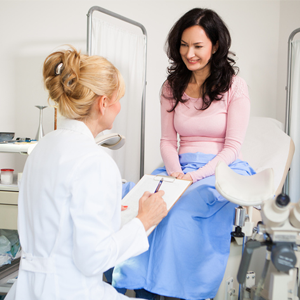
Worldwide, cervical cancer (CV) is the fourth most common cancer in women.
Here, it’s the second most common cancer. Black women are more likely to be affected, and 90% of deaths by CV happen in developing regions.
The reason? Our infrastructure often prioritises immediate concerns, like actual diseases, rather than focusing on preventative measures, like routine Pap smears, the test that checks for precancerous cells.
That’s likely because screenings are damn expensive and access to healthcare in SA is so limited. Use these facts to help keep your cervix healthy.
You need an annual gynae appointment
This doesn’t necessarily mean you’re heading out for a yearly Pap smear, but you do need to get your nether regions visually scanned by a doctor. She needs to look out for polyps, which, in rare cases, can become cancerous.
“Although you may not necessarily require a pap smear, the gynaecological exam entails screening for other cancers/malignancies i.e. uterine and ovarian cancers (depending on the age of the patient),” says Dr Natacha Allan, a general practitioner from Intercare Woodhill.
If you get an abnormal Pap result, your doctor will test you for human papillomavirus (HPV), one of the biggest precursors to cervical cancer.
Read more: 5 cancer screening tests every woman should have
Over 30? Get a combo test
At public hospitals, guidelines prioritise high priority (HIV-positive) patients get co-tested for both HPV and are given a Pap smear. But if you can, ask to get given a co-test regardless.
Nearly all women will get HPV at some point in their lives – it spreads through vaginal, oral or anal sex – and while the majority of cases clear up on their own within a year or two (often without symptoms), the virus is most likely to cause abnormal changes in cervical cells when it lingers in a woman’s body for at least a decade.
That’s why co-testing is so important.
You’re not too old for the HPV vaccine
Best practice is to get yourself vaccinated before the age of 26. But if you’re older, it’s not too late.
Both men and women can be vaccinated, even if you’ve been diagnosed with HPV before since there are more than 170 types of the virus.
“Even though a patient may be infected with one type of virus, we often identify the virus and still give the vaccination as protection for the other virus types which have not been contracted,” says Dr Allan. “Each patient will require an individualised approach and should discuss risk and benefit with their doctor.”
Read more: The 411 on why you shouldn’t delay your Pap smear screening
Screening is the best way to prevent cervical cancer
When caught early, cervical cancer is highly treatable, says gynaecologist Dr Sheeva Talebian. Even more encouraging: Experts believe 93% of cervical cancers could be prevented altogether.
Plus, one of the most common STDs – and the one that almost always causes cervical cancer – can be nixed if women just go for regular Pap smears.
Word to the wise: CANSA offers Pap smears via their mobile screening unit.
This article was originally published on www.womenshealthsa.co.za
Image credit: iStock




 Publications
Publications
 Partners
Partners















